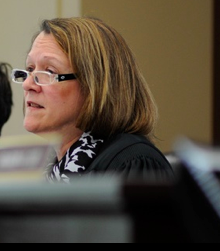Crime victims blast Tennessee Supreme Court justice

By Chris Butler | Tennessee Watchdog
NASHVILLE — Don’t wear your emotions on your sleeve in a Tennessee courtroom. Members of Tennessee’s Supreme Court, like “Dragnet’s” Joe Friday, just want the facts.
Two Nashville crime-victim advocates, Verna Wyatt and Kathleen Starnes, told Tennessee Watchdog they and other crime victims are furious at the court, particularly Justice Connie Clark.
Wyatt, who maintains a Facebook page about the justices, said she lost her sister in 1991 to a violent sexual assault and murder.
Justice Connie Clark
“In the middle of our grief we found out that victims don’t really have any rights,” Wyatt said. “It’s all about the offender. And prosecutors have to be careful not to even say the victim’s name.”
Wyatt said it took years of work for her and others to have the right to give what is known as a victim impact statement during the sentencing phase of a person convicted of a capital crime.
She takes issue with what Clark wrote in a 2006 opinion affirming the death sentence of Leonard Young, convicted of killing a University of Memphis graduate student in Memphis in 1999.
“He testified that the department ‘ground to a halt,’” Clark wrote in her opinion. “Students were unable to complete their work and professors unable to teach their classes. He went so far as to claim that the murder threatened the career aspirations of some of the students.”
The jury, Clark wrote, shouldn’t have heard this type of victim-impact testimony.
Did the supposedly unfair testimony unnecessarily impact the sentencing? Evidently not, Clark admitted.
“We are therefore convinced beyond a reasonable doubt that the jury would have sentenced defendant to death even had it not heard the improperly admitted testimony,” Clark wrote.
Clark’s comments, Wyatt told Tennessee Watchdog, were overkill and have had a negative impact statewide.
“She laid the groundwork for reversing a sentence when appeals come in that claim the victims’ impact statement was too emotional,” Wyatt said.
“This is a huge problem.”
Victims of violent crime now tell Wyatt that lower court judges are sanitizing victims’ impact statements as a result.
“They are told ‘Do not cry,’” Wyatt said. “They are told not to show emotion. That’s torture for someone in that situation.”
Tennessee Watchdog reached out to Clark’s campaign staff, as well as members of Keep Tennessee’s Supreme Court Fair for comment, but no one returned calls by late Friday afternoon.
However, court spokeswoman Michele Wojciechowski told Tennessee Watchdog on Friday that Clark was citing established law in her opinion.
“Every case that goes before a court is very fact-specific. You have to consider everything in the context of the facts presented in the case,” Wojciechowski said.
“This is a complex, 31-page opinion. The entire opinion, along with the facts of the case, the laws and other opinions it cites, as well as the ultimate ruling of the court that affirmed the guilt and upheld the sentence of death, are the context to consider for an accurate representation of what happened.”
Meanwhile, Starnes, who survived a 1985 rape, told Tennessee Watchdog court officials need to tilt justice back in favor of victims.
“Unless you’ve walked in our shoes you have no idea what it’s like,” Starnes said. “If Justice Clark is indicating that these impact statements are so emotional then she needs to be on the other side and learn why they are so emotional.”
Contact Christopher Butler at chris@tennesseewatchdog.org or follow him and submit story ideas on his official Facebook page.
Get regular Tennessee Watchdog updates through our Facebook or Twitter accounts
Click here to get Tennessee Watchdog articles sent directly to your email inbox (click Tennessee under “Watchdog News Updates)
Like Watchdog.org? Click HERE to get breaking news alerts in YOUR state!








